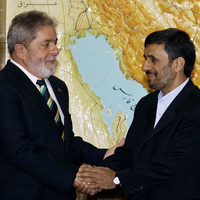The curtain rose on yet another act in the Iran drama this week. It began with the "diplomatic breakthrough" achieved by Brazil and Turkey: an Iranian agreement in principle to the fuel swap proposal, by which uranium is sent out of the country, turned into fuel rods, and returned for peaceful, civilian use. The plot thickened with the announcement by U.S. Secretary of State Hillary Clinton that the other permanent members of the U.N. Security Council -- and in particular Russia and China -- had agreed to bring to the table for discussion a draft resolution imposing a fourth set of sanctions on Iran.
The details, of course, are where both agreements can be derailed. The agreement reached between Iran, Turkey and Brazil still leaves some unanswered questions. Will Iran be allowed to squirrel away a sufficient cache of enriched uranium that could provide the raw material for a nuclear weapon? What safeguards would be in place to ensure that Tehran would not be able to divert elements of a supervised civilian nuclear program toward achieving the capabilities needed for a nuclear weapons breakout?
Questions also remain over the draft sanctions resolution, which at this stage isn't particularly explicit about the types of restrictions that might be placed on Iran's energy sector -- the real Achilles' heel of the regime. What would be the final language adopted by the U.N. Security Council? How far short will it fall from the "crippling sanctions" that the Obama administration has been threatening?

